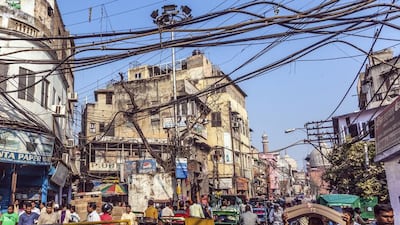She Will Build Him a City is Raj Kamal Jha's fourth novel. Like its predecessors – The Blue Bedspread, You Are Afraid of Heights, Fireproof – it is concerned with the condition of contemporary India: with its contradictions, its dangers, its future.
It has at its heart a sense of uncertainty, deprivation and foreboding. The title is calculated to invite questions. Who will build a city, and for whom? How? When? Why should such a city be needed? Jha offers no clear answers, but a clue to the last is offered by the first of the novel's two epigraphs, from Charles Dickens's Oliver Twist: "Midnight had come upon the crowded city. The palace, the night-cellar, the jail, the Madhouse: the chambers of birth and death, of health and sickness, the rigid face of the corpse and the calm sleep of the night: midnight was upon them all."
A brave writer, to open a novel by quoting a prose stylist of the quality of Dickens. And, perhaps, also a foolish one. For although there are obviously large temporal and geographical differences between the world of which Dickens is writing and that chronicled by Jha, the ingredients and the themes of Jha's novel are inescapably those that Dickens did so much to make his own. Like Oliver Twist – like so much of Dickens's work – She Will Build Him a City is concerned with the metropolitan coexistence of health and sickness, poverty and wealth. It too has its chambers of birth and death, its corpses, its insane, its great institutions and small sites of sanctuary. It too features a city in the grip of midnight, its streets full of predators, poverty, prejudice.
And it too is populated by that most Dickensian of subjects: the character who is adrift in the world. A vulnerable and orphaned child lies outside Little House, wrapped in a blood-red towel and alone; a woman sits in her home and reminisces in the presence of her sleeping, secretive and distant daughter; a wealthy young man moves through the city, dreaming of desire and death. Jha refers to each of these characters as Woman, Man and Child (sometimes Orphan), telling their stories in a cycle of more-or-less discrete episodes.
Presumably his intention here is to replicate in the structure of his narrative the radically different spheres of existence that are generated by city life, while also establishing a sense of anticipation that builds slowly (indeed, glacially) over the course of the novel as it suggests ways in which these lives might be connected. This can be an effective way of developing a plot (one thinks of Dickens's Bleak House), but it is also a difficult technique to employ successfully – and employ it successfully, I am afraid, Jha does not.
There are two principal – related – reasons for this. The first is that his chapters rarely extend beyond three or four pages. Presumably this is supposed to keep the reader interested in each character’s story, but the constant cycle of mere glimpses into their lives, combined with the incremental and self-consciously portentous development of the plot, maintains nothing but the reader’s frustration. This frustration is compounded (my second point) by Jha’s prose, which has little of the freshness or the resonance that is required if a writer is to breathe life onto the page. What it does have is cliché (“who does she think she is, he muttered under his breath”), repetition (if something is motionless there is a good chance the words “as in a painting” will not be far away), robotic dialogue, discordant colloquialisms (“scaredy-cat”), and a tendency to offer two adjectives where none will do. There is nothing wrong with adjectival prose, but adjectives, like all words, need to earn their presence in a book. It is not good enough to throw them in for literary colour.
My objections to this novel will not, I imagine, be widely shared. It has already been favourably compared (following a nudge from its publishers) with Salman Rushdie's Midnight's Children, that most vibrant, expansive and Dickensian of books. It seems likely that further favourable comparisons will come. My advice would be to read both Rushdie and Jha. One will show you an apprehension of the world that is truly literary, that knows that seriousness is not the same as solemnity, that uses language with reverence, precision, joy. The other will give you only the illusion of literature, only the performance of profundity. I will leave you to decide which is which.
The book is available on amazon.
Matthew Adams is a London-based reviewer who writes for the TLS, the Spectator and the Literary Review.

